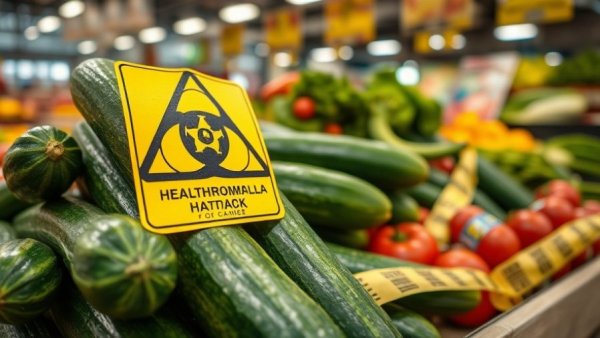
The Widespread Infection: Understanding the Salmonella Outbreak
A concerning salmonella outbreak linked to cucumbers has made headlines across the United States, sickening dozens and prompting extensive recalls. Recent reports indicate that at least 45 individuals across 18 states have fallen ill, with 16 hospitalizations noted. This outbreak is particularly alarming, highlighting food safety issues we all need to be aware of.
The outbreak traces back to cucumbers produced by Bedner Growers in Florida. With the U.S. Food and Drug Administration (FDA) raising red flags, consumers are urged to discard not only the cucumbers themselves but also products that may contain them. Grocery giants like Walmart and Target have been drawn into the recall, with several ready-to-eat items among those connected with these tainted cucumbers, including sushi rolls and salads.
Salmonella: A Persistent Threat
Salmonella is a type of bacteria that can cause serious illness, and these outbreaks often remind us of its dangers. This bacterium can thrive in animal feces and contaminate food sources if not handled or washed properly. Symptoms of salmonella typically manifest 6 hours to 6 days after exposure, leading to cramps, diarrhea, nausea, and fever, particularly dangerous for vulnerable populations like young children and the elderly.
According to the CDC, salmonella is a leading cause of foodborne illness in the U.S. and worldwide. The response from both health authorities and growers is crucial to mitigate the spread, especially considering how easily contaminated produce can reach our dinner tables without proper washing.
The Recalls: What You Need to Know
Retailers are on high alert, and several have joined the call for consumers to toss any cucumbers or cucumber products bought within the affected time frame. Initially, Bedner's Farm Fresh Markets in Florida were identified as the starting point for this outbreak, but the scope quickly expanded to include multiple retailers and products. All items linked to said cucumbers were available from April 29 to May 19 this year.
Specific products from Target and other stores that have been recalled include Greek-style chicken salads and certain sushi rolls. The key takeaway for consumers is to remain vigilant and take necessary precautions when handling and consuming fresh produce.
How to Protect Yourself: Food Safety Tips
In light of this outbreak, food safety measures become paramount. The best defense against salmonella and similar pathogens is to wash your hands, utensils, and surfaces regularly. When it comes to fresh produce, thoroughly rinse fruits and vegetables under running water before consumption. Keeping raw and cooked foods separate helps to prevent cross-contamination, as does cooking food to appropriate temperatures.
As part of the effort to keep our kitchens safe, remember these four food safety steps: Clean, Separate, Cook, and Chill. By making these practices a part of your routine, you can greatly reduce the risk of foodborne illnesses.
Community Impact: The Broader Picture
This specific salmonella outbreak emphasizes the need for increased transparency and accountability in food sourcing. Consumers deserve to know where their food comes from and how it is handled before it reaches their plates. As this outbreak broadens our understanding of the potential dangers in our food systems, it also emphasizes the role we play as consumers in advocating for safe food practices.
Moreover, this situation puts a spotlight on the importance of supporting local farmers who prioritize sustainable practices. By choosing local produce and building connections with farmers, consumers can help foster a more resilient food system, ultimately reducing the chances of similar outbreaks.
Stay Informed: Why Knowledge is Empowering
As we navigate such health crises, having reliable information is vital. Staying updated on food recalls and health advisories protects not just you, but also your loved ones. The CDC routinely releases information on salmonella and food safety guidelines, which can empower families to make informed choices.
Use this moment to become an advocate for safe food practices in your community. Share insights on food safety with friends and family, attend local workshops, and encourage discussions about sustainable practices. Each little action contributes to a larger movement toward healthier and safer food choices.
Conclusion: Taking Action Toward Healthier Choices
In conclusion, the cucumber-linked salmonella outbreak serves as a stark reminder of the importance of food safety and consumer awareness. By understanding the risks, exercising precautions, and advocating for safe practices, we can make strides toward a healthier food system. Stay vigilant, stay safe, and continue to seek out wellness trends that support your overall health.
Remember that your choices matter. Stay informed about food safety, and advocate for practices that align with health and sustainability.
 Add Row
Add Row  Add
Add 




Write A Comment